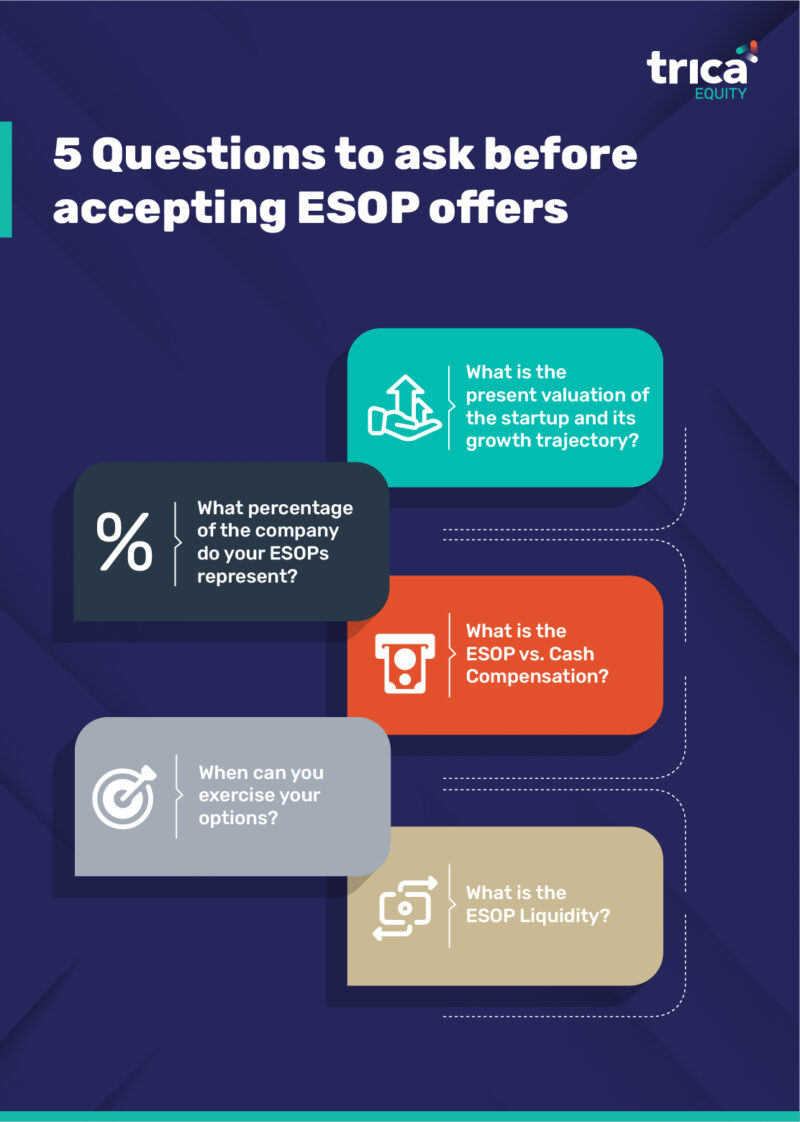
5 questions you must ask in your interview about ESOPs.
Nothing improves an employee’s financial security more than owning equity (ESOPs) in a successful startup. Employees should:
- Ask pointed questions to ensure that ESOPs are not just money on paper.
- Demand formal letters for all ESOP-related documentation
- Understand the pool size, the vesting schedule, and the exercise period on exit.
“Liquidity of ESOPs depends on the founder. But the employees should make sure that they understand the true value of ESOPs that are granted to them. What matters is the percentage of the company that the ESOP pool represents, how long it will take to vest, and the next liquidity event.”
–Satheesh KV, ex-HR Director at Flipkart
What questions can you ask at the final stage of your interview?

1. What is the current valuation of the startup & growth trajectory?
Not all companies are the same. While some will become unicorns, others won’t. Understand the current valuation, and ask about the roadmap. You should evaluate the startup’s growth and see if they are going in the right direction and if you can generate a decent profit out of your granted options.
2. What percentage of the company do your ESOPs represent?
A large ESOP grant is attractive, but what percentage is that number of the total equity?
Suppose you get offers from two companies. While the first company offers you 1000 options out of 1,00,000, the second offers 500 out of 10,000. You have more skin in the game in the second company, but you have to ask the founder why the ESOP pool is so tiny and when it will be expanded. These questions will help you better understand the founder’s vision.
3. What is the ESOP vs. Cash Compensation?
Some companies offer a cash component that is higher than the market average. They do this to provide fewer ESOPs. And some companies do the opposite. You should know if the company has aggressive cash or ESOP policies.
This comparison will help you evaluate your potential employer’s outlook and policies on team, culture, and rewards.
4. When can you exercise your options?
When can you exercise your options? The grant and offer letter will have all the formal information but ask these questions directly to the founders or HR.
Most companies allow employees to exercise their options within 90 days of departure. If you don’t, your options will lapse, and you won’t be able to claim them. Know the ESOP policy well, and be prepared to exercise your options beforehand!
You need to know: What if you decide to leave the company before all your options have vested? Is there a policy for accelerated vesting at the time of a merger? Can you exercise your ESOPs early? Is there a potential buyback in the upcoming years?
What Red Flags must you be aware of?
It is essential to understand and identify red flags so that you can decide on joining the startup. Here are two red flags to watch out for:
1. A small ESOP pool at an early-stage startup
With a wealth-sharing motive, founders will always create larger ESOP pools at an early stage. If an early-stage startup has an ESOP pool of less than 10% of total equity, you might reconsider your decision to join the startup.
2. Formal grant letters are not issued.
Ensure that a formal grant letter will be issued when you join. If ESOPs are just promised verbally, there might be a possibility that your grants will be delayed or you will face complications while completing the ESOP lifecycle.
Understand the nuances of ESOPs. Click here for our comprehensive ESOP dictionary
ESOP & CAP Table
Management simplified
Get started for free

